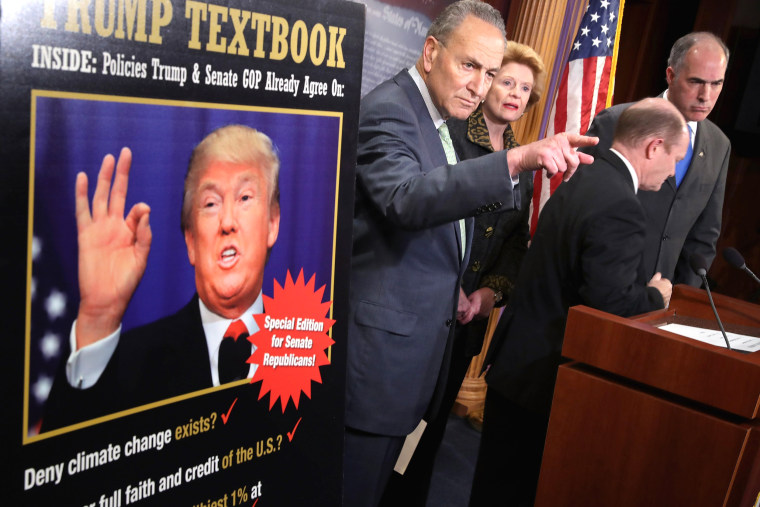The GOP’s winding path to unification around Donald Trump has had the collateral damage of muddling Democrats’ message as they try to settle on a playbook to go after the GOP’s presumptive presidential nominee.
Is the Republican Party doomed because it’s hopelessly dis-unified, with Republican leaders keeping their distance from Trump? Or is it doomed because it’s running towards Trump and embracing him? Democrats aren’t sure.
Trump emerged from his meeting with House Speaker Paul Ryan Thursday without an endorsement, but with a statement saying the two leaders had “few differences.”
That left Democrats advancing two different narratives, each in tension with the other.
The campaign of Hillary Clinton emphasized the non-endorsement.
They quickly added Ryan’s name to a long list of others in the “chorus of Republicans and conservative commentators from around the country rejecting his unpredictable, risky and divisive candidacy.” The list includes Republican elected officials and conservative thought leaders, some whom are also featured in a video the campaign produced of Republicans distancing themselves from Trump and criticizing the nominee.
The message: Donald Trump is so terrible, even Republican leaders want nothing to do with him.
Meanwhile, Democrats in Congress took a different tact.
Senate Minority Leader Harry Reid took to the Senate floor to say Republicans had “fully embraced” Trump.
"The Republican leadership in both houses are marching in lockstep with Donald Trump," Reid said. "Donald Trump is everything that the Republican leader and his party could ever want in a nomination. Trump’s policy positions are identical to the Republican Party platform."
Related: What the Conservative Movement Wants From Donald Trump
At a press conference in the Senate after Trump’s meeting on Capitol Hill, Democrats displayed a poster listing “policies Trump and Senate GOP already agree on.”
“Donald Trump and Republicans are singing from the same hymnal,” said New York Sen. Chuck Schumer, who is set to takeover for Reid next year.
The message: The Republican Party is so terrible, they’re throwing in their lot with Donald Trump.
Privately, some Democrats have griped about the party’s scattershot angle on the real estate mogul.
The difference in emphasis speaks to a difference in goals. Clinton is trying to beat Trump, while Reid and his colleagues are trying to beat Republicans down the ballot and tarnish the GOP brand as a whole. On one hand, stoking disagreements between Trump and the GOP may make independent and even some Republican voters feel more comfortable voting for Clinton. On the other hand, it risks giving Republicans the appearance of independence from Trump.
Which message will win out is what Democrats are grappling with now as they decide how to best challenge a candidate who can be an amorphous target.
Tim Miller, who has spent months fighting Trump from inside the GOP, first as Jeb Bush’s communications director and then in the anti-Trump movement, said Clinton’s disunity message is the wrong approach.
"Donald Trump’s policies, rhetoric, and behavior over 70 years repulse most of the general electorate. Far be it for me to give Dems advice, but tagging our party with that seems far more potent than whether or not Senator Schmidlab has officially united,” Miller said, using a made-up senator’s name.
Related: Donald Trump Denies Posing as Publicist in 1991 Interview
Clinton’s campaign believes it’s important to emphasize what they say makes Trump uniquely unqualified to be president, according to a campaign aide, who argued that Clinton and Reid’s messages are not in conflict, but actually reinforce each other as flip sides of the same coin. Clinton’s campaign decided to go its direction in part because they knew other Democrats would take the supplemental approach, the aide added.
Indeed, even though Clinton’s message of late has focused on Trump’s differences with Republicans, the former secretary of state started hitting Trump last year by saying the rest of the GOP field was no different to him when it came to policy.
Still, the window is closing for Clinton to play the disunity card now, said Steve Schale, a former Obama campaign aide and Florida-based Democratic strategist.
“It is an easy game for now — point out all the #nevertrump folks and argue they can’t get it together,” he said, “but I suspect that case will be harder to make given the speed at which the bulk of the GOP is getting in line.”
When the party does unite, Schale said, the Democrats can call them disingenuous for their support.
“In some ways, I could see GOP candidates paying a higher price in defending Trump than Trump himself for some of the insane things he says,” he added. “At this point, the excessive rhetoric is built into the brand – voters who are supporting him or who are considering him are doing so with the full knowledge of his sins.”
No so for other Republicans.
This article first appeared on MSNBC.com

